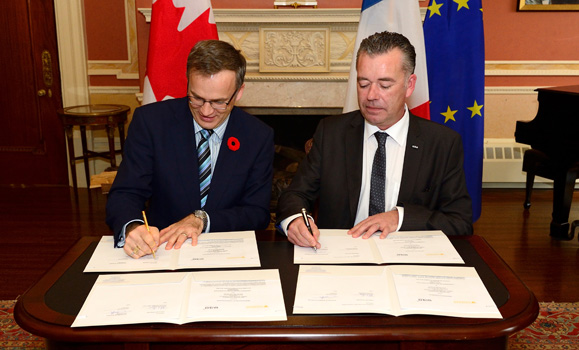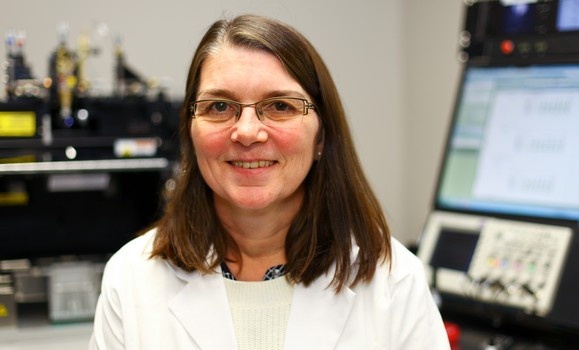The prevailing currents in the Atlantic Ocean flow from Canada’s east coast to Europe, eventually touching France’s famously beautiful and rugged region of Britanny.
Halifax in Nova Scotia and Brest in Brittany are cities with many parallels: they are both important harbours and have a long naval history. They are each also the home of a leading ocean research university: Dalhousie and the Université de Bretagne Occidentale (UBO).
While researchers at the two universities have forged connections in recent years, the relationship hasn’t been formalized. That is, until Monday, when Dr. Florizone and UBO’s president, Pascal Olivard signed a formal Memorandum of Understanding that will pave the way for a more robust relationship between the two universities which respectively have about 18,000 students.
The signing ceremony was one of the events planned for a French state visit to Canada. A celebration of the strong research ties between France and Canada, the event included the finalization of six accords between universities and national research bodies witnessed by David Johnston, Canada’s Governor General and Najat Vallaud-Belkacem, France’s Minister of National Education, Higher Education and Research. The gathering took place at the Rideau Hall in Ottawa.

President Florizone signs the new MOU with Pascal Olivard, Président Université de Bretagne Occidentale, at Rideau Hall in Ottawa (Sgt Ronald Duchesne, Rideau Hall, OSGG photo).
The partnership adds an important piece to the portfolio of key strategic international partnerships mapped out Dal’s international strategy, explains Alain Boutet, executive director of Dal’s International Relations office.
“The cooperation with Brittany as a region of great expertise in Marine Sciences builds on important similarities between our universities, particularly in key areas for the academic and scientific development of Ocean Studies from a multi-disciplinary perspective,” says Dr. Boutet.
More opportunities for oceans collaboration
Julie La Roche, an oceans researcher in the Department of Biology, has worked with UBO researchers in the past. She’s excited about the agreement because UBO is one of the leading oceanography institutions in world, and the agreement will let her expand the reach of her projects.
“The MOU will allow more researchers to collaborate with European colleagues, and it will promote the exchange of ideas, methodology and lead to our participation in joint projects related to the Atlantic Ocean,” says Dr. La Roche. “We are hoping also to have students moving back and forth between Dal and UBO.”
A group of Dal researchers, including Dr. La Roche, Lucia Fanning (past director of Dal’s Marine Affairs Program) Sara Iverson (scientific director of Dal-headquartered Ocean Tracking Network) and Anna Metaxas (Department Oceanography) recently crossed the Atlantic to meet with researchers at UBO.
According to UBO’s website, Brest is home to 60 per cent of French marine researchers and several major research organizations. The two universities are working out details of collaborations and various student exchanges and co-supervision of graduate students. Dr. Metaxas hosted UBO students this summer.

